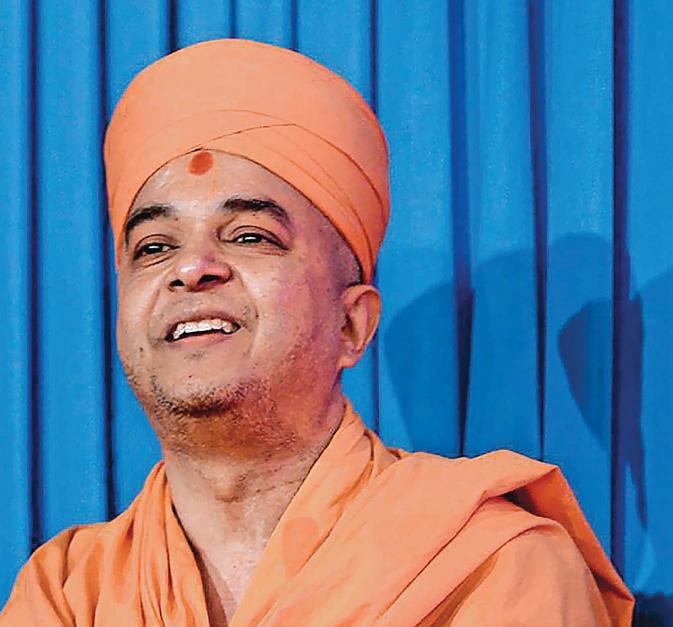
Brahmavihari Swami has played a pivotal role in the creation and design of various BAPS temples world-wide, and was the driving force behind the temple in Abu Dhabi. Excerpts from an interview:
Q/ What is the significance of the first traditional Hindu stone temple in the Middle East?
This temple is a great message of hope and harmony for humanity. A temple of love and harmony, when the world is being polarised. That is the role of a spiritual place.
From a cosmic level when you look at the earth, there are no borders. People create borders and divisions. People fight because of their mindsets. A temple like this will change the mindset of mankind, so that religions, cultures and values can flourish together. All people want is harmony. We can gift our children properties, luxuries and bank accounts, but if we cannot give them a world of peace and harmony, then what’s the point? If a country is huge but not in harmony, it is a rogue nation. If a family is rich but lives in disharmony, it is a broken home. If a company is multinational but internally disunited, it eventually disintegrates. Disharmony does more damage to life and the living. Perhaps, the greatest capital the world needs today is ‘harmony capital’.
Q/ There are more conflicts in the Middle East than anywhere else in the world. How will the temple help in promoting peace in the region?
Hundreds of people told me that a traditional temple, built of natural stone, of this magnitude, was not possible in this region. But, as hearts and minds connected, everyone connected, and it became possible. Genuine places of worship are a source of harmony. How can we talk about heaven up there, if we cannot create a little bit of heaven down here!
Denne historien er fra February 25, 2024-utgaven av THE WEEK India.
Start din 7-dagers gratis prøveperiode på Magzter GOLD for å få tilgang til tusenvis av utvalgte premiumhistorier og 9000+ magasiner og aviser.
Allerede abonnent ? Logg på
Denne historien er fra February 25, 2024-utgaven av THE WEEK India.
Start din 7-dagers gratis prøveperiode på Magzter GOLD for å få tilgang til tusenvis av utvalgte premiumhistorier og 9000+ magasiner og aviser.
Allerede abonnent? Logg på

What Will It Take To Clean Up Delhi Air?
IT IS ASKED, year after year, why Delhi’s air remains unbreathable despite several interventions to reduce pollution.

Trump and the crisis of liberalism
Although Donald Trump's election to a non-consecutive second term to the US presidency is not unprecedented—Grover Cleveland had done it in 1893—it is nevertheless a watershed moment.

Men eye the woman's purse
A couple of months ago, I chanced upon a young 20-something man at my gym walking out with a women’s sling bag.

When trees hold hands
A filmmaker explores the human-nature connect through the living root bridges

Ms Gee & Gen Z
The vibrant Anuja Chauhan and her daughter Nayantara on the generational gap in romance writing

Vikram Seth-a suitable man
Our golden boy of literature was the star attraction at the recent Shillong Literary Festival in mysterious Meghalaya.

Superman bites the dust
When my granddaughter Kim was about three, I often took her to play in a nearby park.

OLD MAN AND THE SEA
Meet G. Govinda Menon, the 102-year-old engineer who had a key role in surveying the Vizhinjam coast in the 1940s, assessing its potential for an international port

Managing volatility: smarter equity choices in uncertain markets
THE INDIAN STOCK MARKET has delivered a strong 11 per cent CAGR over the past decade, with positive returns for eight straight years.

Investing in actively managed low-volatility portfolios keeps risks at bay
AFTER A ROARING bull market over the past year, equity markets in the recent months have gone into a correction mode as FIIs go on a selling spree. Volatility has risen and investment returns are hurt.